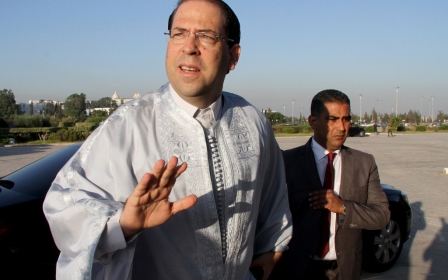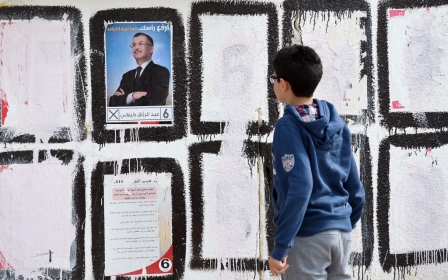Tunisian presidential candidate Karoui detained on corruption charges

A judge ordered the detention of Tunisian presidential candidate Nabil Karoui on corruption charges, a local radio station said, just weeks before voters head to the polls, Reuters news agency reported.
Karoui, along with his brother, is being prosecuted on charges of tax evasion and money laundering. Both are banned from travelling and their assets have been frozen.
Stay informed with MEE's newsletters
Sign up to get the latest alerts, insights and analysis, starting with Turkey Unpacked
Nessma TV channel, owned by Karoui, reported that he had been arrested as he travelled to Tunis on Friday.
"The police arrested Karoui while we were on our way back from the city of Beja to Tunis," said Osama Khelifi, a political adviser to Karoui, as quoted by Reuters.
Karoui, a media mogul, had been shown in some June polls to be leading the race to replace former president Beji Caid Essebsi, who passed away last month.
Still, the corruption allegations are not the only obstacles Karoui's campaign is battling.
A law passed in June banned candidates who received unfair political publicity, as well as those who own a charity.
The law sought to prevent unfair advantages and foreign funding from influencing the vote.
Karoui has been accused of playing up his highly publicised charity work through his non-profit organisation, Khalil Tounes, and promoting himself on his own TV channel, Nessma, where he announced his candidacy in May.
Although the amendment was passed by parliament, it remains unclear whether it will be enforced because it was not signed by Essebsi before his death on 25 July.
A statement from Karoui's office at the time condemned the move as "a dangerous sign of the return of dictatorship and retreat from the electoral process".
Despite his prominence, Karoui portrayed himself as an outsider candidate, citing his lack of previous government experience, in an interview with British newspaper The Times in June.
Tunisia's elections were supposed to take place on 17 November, but were moved up by two months after Essebsi's death.
The official election campaign runs from 1 to 13 September, with the voting on 15 September.
Tunisia's president controls foreign and defence policy, governing alongside a prime minister chosen by parliament and who has authority over domestic affairs.
Middle East Eye delivers independent and unrivalled coverage and analysis of the Middle East, North Africa and beyond. To learn more about republishing this content and the associated fees, please fill out this form. More about MEE can be found here.





